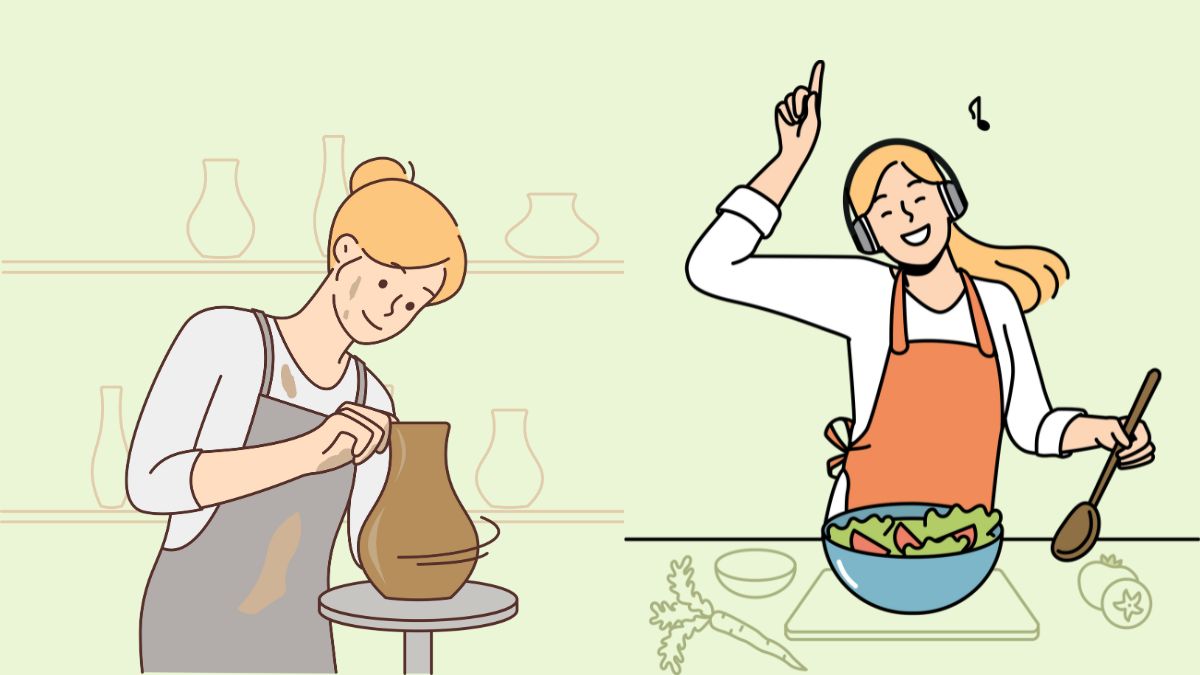If you've been struggling to find a diagnosis or haven't yet gotten a grip on your chronic illness, life probably seems pretty hopeless right now. You're likely facing a ton of stress, anxiety, and sadness from your new normal. Getting a chronic illness diagnosis can be life-altering, especially if you're someone who hasn't had a chronic illness before. That's why developing healthy coping strategies and taking care of your mental health in addition to your physical health is vital.
When I got diagnosed with multiple chronic illnesses three years ago (after being undiagnosed for ten years), I had no idea what my life would look like or how I would cope with the uncertainty. Over time, I started gathering coping strategies that have improved my quality of life and made it easier to handle the daily toll that chronic illness takes on my body. Here are some of the things I’ve found that work for me. Some of these strategies may seem a little daunting at first, so check out my tips to make each suggestion a little easier to get started with.
1) Try Going to Therapy

Chronic illness takes not only a physical toll but also a mental one. Accepting that your life is different now requires a huge paradigm shift. You may no longer be able to do the things you used to, and it can be harder than you thought to let them go. But you don't have to do it alone. Therapists can provide support, help you process the changes in your life due to your health, and teach you effective coping strategies.
Additionally, those suffering from chronic illness are more likely to develop mental health illnesses like depression and anxiety. Chronic illness is taxing even on the mentally strongest of people. Talking through these mental hurdles with a trained professional can help you lower your risk for conditions like anxiety and depression, giving you one less thing you need to worry about.
My Tips Finding a therapist can be really hard and feel daunting. To make it a little easier, I recommend using Psychology Today to narrow your search by location, insurance network, and any specialties you’re looking for. You may have to send a lot of emails and make a lot of calls, but don’t give up. When you find a therapist with availability that works with your schedule, set up a trial appointment to see if you like their working style. It’s important to make sure your therapist is right for you, which may mean you have to shop around a little to find one that works best!
2) Practice Mindfulness

Close your eyes and listen to the sounds around you. If you're at work, maybe that's the sound of people talking down the hall or someone typing at their computer. If you're home, maybe you hear your cat purring on your lap or birds outside your house. Pay attention to the smells around you or how your shirt feels on your skin. If you did all this, you just got a taste of what mindfulness is. If you didn't (which I don't blame you, it's not easy to do), mindfulness is the act of being present and reflecting on the world around you right now.
Mindfulness can be especially helpful to practice when coping with a chronic illness. Your past life is probably very different from your new reality, so dwelling on the past or worrying about the future can hurt your mental health. That's why taking time to learn how to experience the present can do a lot for your health. It can decrease your risk of anxiety and depression, and it may even improve sleep or help you cope with pain.
My Tips Mindful.org has some great free mindfulness resources to get you started!
3) Accept Where You Are

This next piece of advice is one of those things you must constantly remind yourself. Everyone's experiences with chronic illness are different. Even those with the same diagnosis as you likely aren't feeling the same way. You may notice others with a similar diagnosis appearing to do better than you. Even so, that doesn't mean you're not doing enough or they're tougher than you. Nobody's chronic illness journey is the same; you must remember that.
Therefore, it's important to meet yourself where you're at. As painfully slow as the path to progress seems, focusing on one small step at a time can really help. For you, that may mean going to physical therapy once a week or just getting out of bed in the morning. Finding manageable tasks can make you feel like you're making progress, even if they were something you easily could do before. You and your body are trying your best, and acknowledging the hard work and progress you've already made can improve your mental health during a hard time.
Lastly, it’s ok to grieve the life you had before. It’s an important step to accepting your current situation and understanding that it may never go back to the way it used to be. However, it might be a difficult thing to do alone, and relying on a therapist can really help.
My Tips Set boundaries with yourself in this process. Is social media feeling toxic? Set boundaries with social media — unfollow toxic chronic illness accounts or set time limits for yourself on the apps.
4) Experiment with Different Types of Exercise

Physical activity has a lot of benefits; it can improve your physical and mental health in plenty of ways and leave you feeling better than before. Still, it can be hard to find ways to exercise when dealing with a chronic condition, and what you used to do for exercise may not be realistic anymore.
However, there are plenty of lower-intensity ways you can exercise. For example, even something as simple as going for a walk can get your blood flowing and help with fatigue. Activities like swimming, pilates, and yoga are also great lower-intensity types of exercise. That said, going overboard with exercising before your body is ready may hurt you in the long run, so it's essential to understand what is feasible and what is not. Talk to your provider about what types of exercise might be best for your condition. Remember, even a little physical activity can help, so there's no shame in starting small.
My Tips Even a walk around the block counts!
5) Talk to Your Support System

Chronic illness takes a large mental toll, and sharing your feelings, experiences, and emotions with your friends and family can help ease that toll. Being vulnerable about the difficulties of your condition can help others better understand what you are going through. For example, you may find that with your condition, you have to miss certain events like birthdays or weddings, and opening up about these struggles with friends and family will make them more sympathetic to your position.
Talking about the struggles of your chronic illness might also help relieve your stress and anxiety. In addition, hearing comforting and encouraging words from those you're close to can make your journey a little easier.
My Tips It’s really scary being vulnerable, but being honest with those you trust about where you’re at and how you’re feeling makes it easier for them to support and help you.
6) Ask for Help

Similarly, learning to ask for help is an important part of adjusting to chronic illness. Even activities like cooking dinner or doing laundry can become exhausting. On the other hand, asking a friend or family member to run an errand can save your energy and help you avoid painful tasks. Still, it can be hard to ask others for help, especially if you are used to being pretty independent. And it can feel awkward having someone you don't know as well, like a coworker, do something for you. That said, most people are willing to help if you ask nicely.
Additionally, being grateful and patient with others will make them more willing to help the next time. Everyone needs help sometimes, and it's ok to rely on others a bit more than usual as long as you are appreciative. It's important to realize asking for help doesn't make you a burden; it just makes you human.
My Tips Another thing to remember is that it’s hard to watch someone you love struggle with a chronic illness. This is especially true if there’s little they can do to help alleviate your pain and suffering. Helping you out with the little things is a way for them to feel like they’re supporting you on this journey and may alleviate feelings of helplessness those close to you feel.
7) Prioritize Self-Care

I don't know anyone who doesn't feel at least a little better after a face mask or a long bath. Managing a chronic illness is stressful and likely takes up much of your day. That's why even the little things like making a cup of tea or reading a chapter of your book can help you reset and manage your stress. Learn to prioritize your own self-care and set time out of your day for stress relievers. If you're having a particularly hard week, consider getting a massage, or if you're on a budget, buy yourself a cheap back massager or massage gun. Whatever you do to unwind and make yourself happy should be included in your routine. Stress can lower your immune system's defense, cause mental health issues, and even worsen a chronic condition, so prioritize managing it.
My Tips Self-care has been the most important part of my healing journey! Self-care can look like a trip to the spa (I love getting massages for chronic pain!) or a delicious takeout meal and a good movie at home. Self-care can also look like setting boundaries in your life. I’ve set a lot of boundaries around when I work and how I socialize. Communicating these boundaries is key!
8) Start Journaling

Journaling can help you practice a lot of the coping mechanisms mentioned above. For example, journaling your thoughts or about your day can help you practice mindfulness. Reflecting on your thoughts and feelings keeps you in the present moment and helps you better understand yourself. Struggling with a chronic illness can lead to a million different emotions throughout the journey, and articulating these thoughts can help you better identify positive or negative thoughts you are having about yourself and your experience. Sifting through these emotions can also help you accept where you are and the reality of your situation.
Additionally, writing down things you are grateful for or positive moments that happened throughout the day can help relieve stress and improve your mental health and mood. If you're interested in trying this journaling and self-reflection technique, start by writing a summary of your day, ten things you're grateful for, and five different emotions or thoughts you experienced throughout the day. Then, try this for a few nights and see if it makes you feel slightly calmer or happier.
My Tips I write down three things I’m grateful for every night and collect them all in a jar! I’m also a big fan of journals that have prompts for me to fill in, since it adds some nice structure to my journaling routine.
9) Explore Some New Hobbies

As hard as it may be to admit, there are probably several hobbies you can no longer do due to your condition. That being said, there are millions of different hobbies for you to try. If you need less strenuous activities, try to learn a new instrument, try your hand at painting, or build a skyscraper out of popsicle sticks. Depending on where your limits lie, there are likely several new hobbies to try. Instead of spending time dwelling on what you can't do, try to change your focus to things you can do and see if anything catches your interest. Hobbies can enrich your life, help lower your stress, improve your mood, give you a feeling of purpose, and even take your mind off of the pain you may have.
My Tips I picked up piano again, and being able to do something creative like that every day has improved my mental health. Other easy hobbies that I’ve enjoyed doing are: birding, growing plants inside, knitting, needlepoint, reading or listening to audiobooks, researching interesting topics, creating travel itineraries for friends going on trips, and cooking.
10) Don’t Settle

It's important to recognize that many of these mechanisms involve accepting where you are in your journey. That being said, this advice doesn't exist to encourage you not to try to improve your condition. It only tries to comfort some of the turmoil or emotions you might feel. Therefore, this next and ending piece of advice serves as the finishing touch to your roller coaster of feelings and emotions. Don't settle. For you, this may mean continuing to find new treatments and safely improving your health. It may also mean switching providers and specialists if you feel you are not receiving the right care. Whatever this advice may mean to you, it's important to keep striving for improvement and stability.
As powerless as you may feel, there are ways you can learn to manage these conditions. You can use apps like Guava to find symptom triggers or evaluate your treatment plans. With Guava, you can stay on top of medications and even prepare for upcoming visits. Don't let the anger and hopelessness that normally comes with having a chronic illness stop you from making valuable strides for your health. Chronic illness is a continuous fight, and it's one that you can still win.
My Tips You know your body best!! Advocating for yourself and your illness every day can be draining both emotionally and physically, but keep going until you get the answers you need. You’ve got this!






